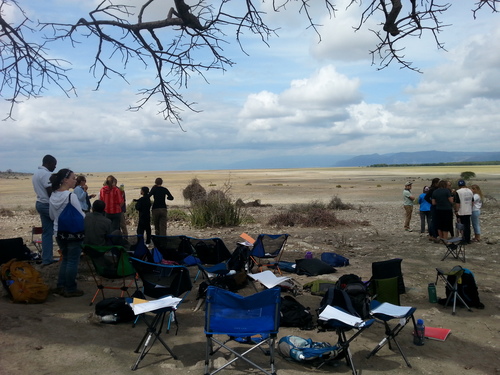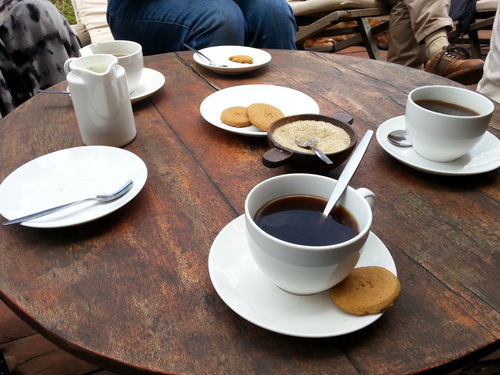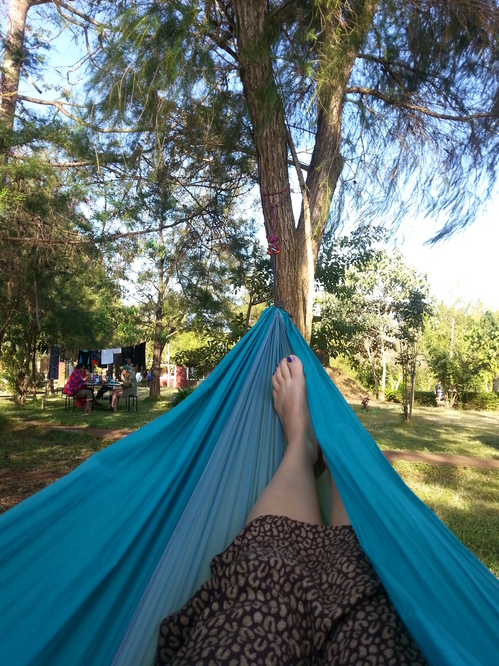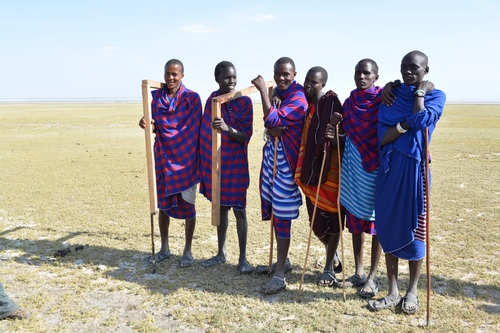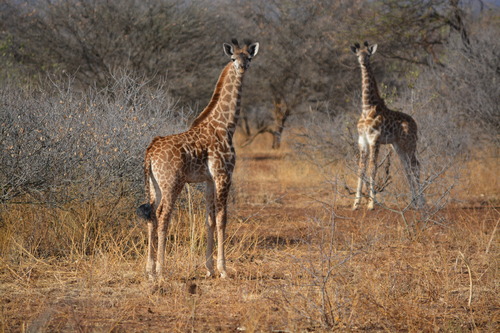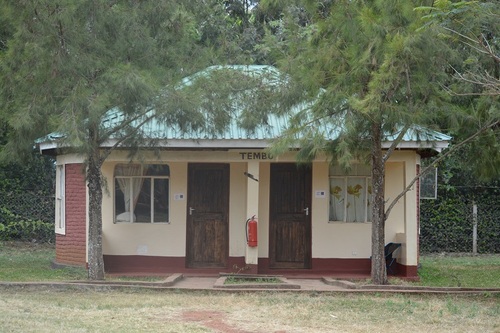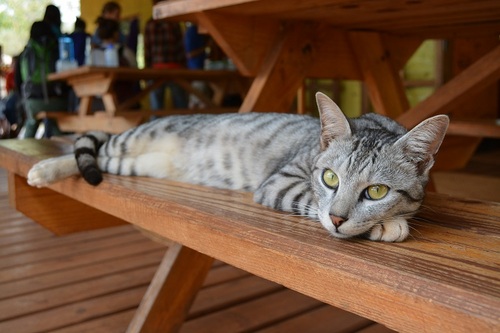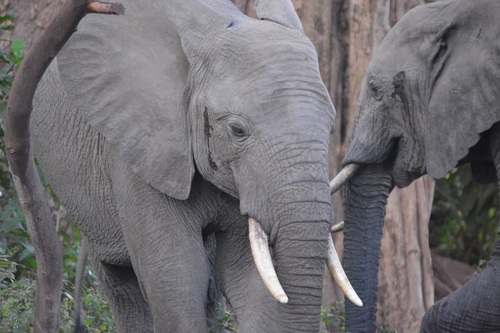
Wednesday, I woke up at 6:15 AM to help cook breakfast in the morning. Breakfast was at 7:30 and we were scheduled to leave camp at 8 AM to go spend a full day with our home stay families! Costa was our driver who took us to meet Mama Koleta, our home stay mama. We only drove about 1 km down the road from our camp and our home stay family came to meet us at the land cruiser. We told our driver, Costa that we could just walk home at 5 PM, when our day with our guest families was over. The father greeted us at the vehicle and walked us to his home. He was very nice and spoke excellent english, (to my surprise). Their home was beautiful! The family had a home made from concrete (surprisingly kind of big), an “outdoor” kitchen made from sticks and mud, and a separate smaller area where they kept rocks formed like a stove and wood for fires to cook. They also had a pretty nice chicken coop made from sticks. The family had a dog and chickens. Kittens from the neighbors’ house also came over to play.
We sat down in the living room with the family and they all introduced themselves. The mama’s side of the family was from Kilimanjaro and two of her sister’s kids were staying with them, and then the father was from Karatu, and they had 3 kids. One was too young for school and the other two had to walk 7 km to Kilematembo to go to school.. which is crazy! The niece gave us a kanga to wear over our clothes, so they didn’t get dirty. Normally, all women wear kangas. In the morning, we cooked breakfast with them.We had chapatis and chai (tea). I helped prepare the chapatis. We sat down in their kitchen and had water brought to us to wash our hands over a bowl.
After breakfast, we walked to the fields to help harvest pigeon peas. The father had us break off the whole stock of dried pea pods and stack them in a pile. After about 45 minutes of harvesting, they gathered strips of leaves from a plant and tied them together to make a rope. They put the ropes underneath each stacks of pea stalks and tied each one into a bundle. The women and little boy began carrying the bundles back on their heads. The father gave Sam and I one small bundle to carry back together. I saw how much the little boy was struggling with the heavy bundle, so I asked if I could carry it. I honestly struggled a bit trying to get it on my head but his sister helped me. When we were getting closer to the house, I noticed that she gave her brother her bundle and proceeded to take the bundle I was carrying back on my head. I reassured her that I was fine carrying it back, and we both laughed, then she took hers back from her brother. The father carried my camera for me, so I wouldn’t get it dirty and he even got my picture when we got back to the house. Carrying that bundle back on my head, I realized how hard these tribal women have to work. Sometimes, they have to carry heavy buckets of water back on their head for kilometers. It was fun for me since I got to try it out.
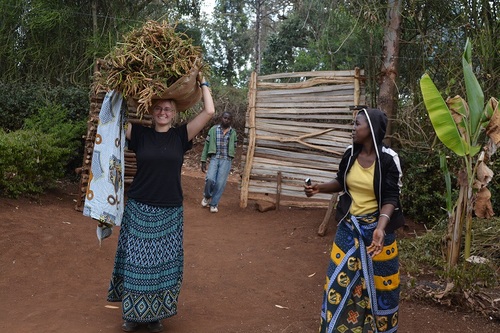
Mama Koleta’s niece was the girl I spent a decent amount of time helping. She spoke some english and taught me words like spoon (mwiko), plate (sahani), knife (kisu), pan (sufuria), bucket (ndoo), water (maji), and to wash (kuosha). She was very nice and I laughed with her a lot. I enjoyed her company, and I truly believe she enjoyed mine, even if there was a bit of a language barrier at points. We didn’t even have to speak much to laugh. She was great! Mama Koleta also tried to teach me a few Swahili words and sentences. She always told us “pumzika,” which means rest. They also wanted us to rest. I enjoyed it, but I also liked helping too.
Three of the kids were sitting outside on some rocks in front of the chicken coop. I asked to take their pictures. I gave each one of them my camera to take a picture of me with them all. They enjoyed using it, and I think the father liked that I let them use my camera to take pictures. They were pretty young, but very well behaved kids. They didn’t seem to play much while we were there though. It was definitely kind of weird, but kind of nice too. Although, I wouldn’t have minded playing some games with them.
We helped cook lunch when we got back. We made a pretty big lunch. We used the food that we brought with us to the family, because we aren’t allowed (and shouldn’t) be eating their food or drinking their water. We made a lot of rice; ugali; a cabage, onion, cooking oil and tomato dish; pigeon peas and beef. I chopped the onions and tried helping stir the ugali (which was interesting–you’d have to know what UGALI is to understand). There was a lot of food, and all of it was good! We went and set outside, and then Mama Koleta’s niece brought us all water to wash our hands and a delicious sliced up papaya from the tree in their back yard. This was the papaya that made me actually LOVE papaya. It was delicious. All of us just kind of relaxed for a while.
We got the chance to talk to the father and ask him some questions. He was very nice and very helpful. He told us some random information. We talked about school, his life, and crops, etc. He said his family has hosted 11 SFS student groups, which is awesome! They were great people! He told us that normally in a good year, he’ll plant mixed crops of maize, beans, and pigeon peas all at once. He told us that he pays about $300 USD a year/child for his kids to just go through primary/secondary school. I think that is crazy! I do understand that in the U.S., taxes are always paid to schools, but seeing the cost of schooling here makes me think. No wonder some families struggle to send their kids to school. Most kids only make it through primary school, and never make it to secondary school, either because they can’t afford it, because they failed their exams, or they chose not too continue with school. He also told us that he worked at a lodge as a host to tourists. He told us that he built his beautiful concrete-like home when he was working at the lodge. The kitchen and cooking area (both have dirt floors) was built before he worked at the lodge. He lost his job when a bandit broke his arm at work. He also sustained other problems after this injury too. The money he had saved up for his kids had to be used for his medical bills. His family still gets the money for his kids to finish school though, because they want a good life for their kids. He didn’t own any livestock, besides chickens, but he told us that they sell their crops as an income. The father wasn’t sure where the bags of pigeon peas went but he knew that once he sold them, they were shipped somewhere. He also told us that when he was employed, he learned how to use a computer and printer. He also did really well when it came to using my camera, and he looked interested in learning more. We also learned that when he was working, the average income was 45,000 TSH (Tanzanian shillings), and now it is 200,000-250,000 TSH, which is significantly better.
After we finished relaxing, we went for a little walk around the house and the father showed us all his plants and trees. I gave the niece my camera to take pictures. She enjoyed it. The father took my camera a few times too to take pictures. He showed us papaya, lemon, avacado, banana, tomato trees, and much more. He showed us his section where he was trying to grow trees to sell. I can’t remember all the trees he said, but I do remember eukalyptus, which is exotic in Africa. When we walked around the house, Mama Koleta was already beginning to harvest the pigeon peas from their pods. She had a wooden bat and was continuously hitting the pea stalks. Peas were flying everywhere, but the harvesting method was much more efficient than sitting down and opening each pod to collect the peas. It was fun to watch, so I had to try. I was no where near as good as Mama Koleta or her niece at harvesting the peas, but it was fun. We all laughed together. After all pods seemed to be broken, we gathered the pigeon pea stalks and sat down to go through the stalks and find any peas that we missed. The peas that were thrown on the ground from the “pea stalk beating” were picked up and thrown in the pea pile. Any green pigeon peas were collected for the family to cook, but the hardened white/brown peas were to be sold.
At one point, the niece chased a kitten out of the house, and the father laughed and told us that all animals fight for fitness. He laughed again and said that they were trying to take the “wazungu’s food.” It was interesting to hear him say that animals fight to be the fitest, because we talk a lot about that at school. He kept saying that animals have to fight for fitness to live and to be strong. I just laughed and agreed.
After we were done, we sat outside on small stools and did the dishes in a larger pot on the ground. Then we relaxed and I noticed Mama Koleta’s niece washing laundry, so I went over to help her out. The father took more pictures of me helping with laundry too. After, he asked if we wanted to have some tea and relax. We were all for it. We sat on the porch and drank tea until it was time to go. At the end, I put my camera on a timer and got all of our pictures. I enjoyed how Mama Koleta and even her niece smiled for the camera. Mama Koleta had a great big smile though. It was great, because I’ve noticed that most people here don’t seem to smile for pictures. The family was so sweet, and the home stay was such a humbling experience. We went outside their gate and met the SFS students next door who walked home with us. The father, son, and niece walked us home on a path that we never knew about. The son took my backpack for me, which I carried my camera bag. They took us to the SFS gate and shook our hands, and even welcomed us back! 🙂 We are going to get pictures printed here and take them back, so they can have them. What an amazing experience with an amazing family!
Thursday, we went to the Mswakini Juu community to interview some local Maasai people about human-wildlife conflicts. It was actually a really fun and interesting survey. Our guide’s name was Stanley. He translated for us and was super cool too! Only thing that was not so pleasant was walking a few hours from where we were supposed to meet at the end of our interviews. We ended up walking further and waiting on the main road for the group. We still had a good time though and a pretty excellent survey group too! The tribe people that we surveyed often said “Karibu tena!” which means “welcome again” in Swahili. We were all exhausted after this day, of course! I also found Tribulus terrestris–goatheads in my shoes. They haunt me! They are all over New Mexico, where I spent my summer working. Now, I find them here!
Friday, we had one class of Wildlife Ecology in the morning and then prepped for our expedition to Tarangire National Park beginning Saturday. We were scheduled to leave by 7:30 AM on Saturday!
Saturday, we started with elephant observations. Our assignment for the morning was to observe 6 groups of elephants and note stress and behavior of all elephants we came across. It was an amazing experience having the chance to observe elephants in the wild (again) and observing them was honestly a touching experience. In Tarangire National Park, there are about 3,000 elephants, which is a little over 1 elephant per 1 km2 in the park. We finished around 12:30 and went to a picnic area in the park for lunch. Here, there were a bunch of crazy vervet monkeys. While, standing at a large picnic table, I watched a monkey run over to our table, jump on the table, grab a package of cookies (still wrapped in plastic) and take off. Then, 5 minutes later, we looked at one of our SFS vehicles and there was a monkey sitting in the passenger seat eating someone’s food. I admit, I thought it was hilarious. Someone left the window and roof open in the Land Cruiser. When someone walked over to scare the monkey away, it jumped out of the roof carrying Pringles in its hands. Haha! It stole half of someone’s Pringles and happened to be eating the driver’s orange in the front seat. It was hilarious, but also kind of sad because the reason these monkeys act this way is due to people feeding them, and they expect people to feed them. After we ate lunch, we went on a game drive with our professor (Christian). We saw quite a few eland in the park, which is rare to see. We saw a bunch of zebras and wildebeest. This was the first time I had noticed in three different groups that there was one lone wildebeest hanging out with a group of zebra. I also saw one zebra hanging with a wildebeest herd, which was interesting. Zebras and wildebeest are often seen together, because zebras will feed on taller, harder grasses and wildebeests prefer shorter, softer grasses. It is beneficial for wildebeest to follow zebra herds, because zebras in a way, “prepare grasses” for other species such as wildebeest. We saw a lone baby elephant wondering the swampy meadow. He was definitely lost and was only about 2 years old. It was very sad. There was a large group of elephants far out in the distance, but all this little guy/girl was doing was walking up and down the swampy meadow, looking lost. When we drove back past it, the baby elephant was bathing itself with water, and seemed a little better.. but still it was a sad moment to experience. I only hope the baby found its mom. Earlier, I saw a young wildebeest calling for its mother. It was still in a group of wildebeest, it just happened to have lost its mother in the large herd. It called for a while, but when it saw our land cruiser, it stopped and stared at us until we drove away. Poor thing. Hope that baby found its mother too. We saw other species such as warthogs, giraffes, banded mongoose, and more! I even saw my first ‘big’ carnivores– a black-backed jackal, three sub-adult male lions, and a leopard!! It was a great day! I couldn’t believe we saw a leopard! This is the animal that I had most wanted to see during my time in Africa. My favorite African animal. It was beautiful. I got very lucky! The leopard was hanging out in a tree (surprisingly close to the lions we saw first) about 400 meters from the road. I was surprised how little leopards are. Before we left, it climbed up higher in the tree. I am extremely happy with this sighting! I even got some pictures!

Sunday, we did our first animal count in the park. My car got to venture up on top of a mountain in the park, which was awesome. We got a great view of the park, but were unfortunately attacked by tsetse flies a lot in the park on this animal count. Tsetse flies are flies that suck blood, and cause sleeping sickness, especially to livestock. We counted animals from the size of a mongoose (egyptian, banded, dwarf) to as big as an elephant, and one bird–the ostrich. After our animal count, we drove to Tarangire Safari Lodge, which is in the park. Here, I took pictures of the wildlife at the lodge and at the overlook, and then went swimming in the lodge pool. In the evening, we went for a game drive. We saw zebras, one lion, wildebeest, cape buffalo, elephants, ostriches, and even drove a road where one side was the park and the other side, cattle were grazing. Goes to show that there isn’t much of a barrier between national parks and human life.
Monday, we conducted our second animal count in Manyara Ranch Conservancy. Although, we surprisingly saw less animals in the conservancy than our professor expected us too. We went back to camp for lunch and hung around until 3. The camp site workers were draining water from a hose in the back of the camp site (I have no idea why they were), and I saw quite a few birds bathing and drinking the water, so I decided to take my camera back there to get some pictures. I then attempted to fall asleep in my 300 degree tent, and did for about 20 minutes. I heard people talking about snakes, so I only assumed that they found one! So, I jumped up, grabbed my camera, and went out to see if/what they had found. They did find a snake. It was a common house snake (Lycodon capucinus). My first snake seen in Africa! Lastly,we had a lecture in the GIS lab in Tarangire National Park. We learned about the park, local community, and wildlife issues. At night, I star gazed. The African sky is unbelievably beautiful.
Tuesday, we were scheduled to survey the local community members in Buruge village in the morning from around 9 to 11. We met our guides at the Burunge Wildlife Management Area office. Our guide told me that he was going to school to be a nurse. We interviewed local tribes on natural resource use–mostly firewood use. We went back to camp and ate lunch, then hung around camp until 3 for our bush walk. At 3, we left camp for a walk through the wildlife cooridor led by Maasai people from the camp. We walked about 8-10 km round trip. On our trip, we met some escapee baby goats who decided to chase us down the hill, “baaing” at us the whole way. It was so cute, we could barely resist wanting to take them home. They followed us for a little while, then stopped under a tree and began foraging. They weren’t far from another large group of goats. Besides goats, we found a baby zebra skeleton (sadly), which could have been poached or died of disease. We also found the trail of big python across the sand, which was absolutely awesome. I would love to see a python while here, but we are pretty positive that’s not going to happen. When we stopped walking, we saw ostriches in the distance. At the end of the night, I went out with a group to take photos using a slow shutter speed on a camera and glow sticks.
Wednesday was our final day on expedition. My tent woke up around 6:30 to pack up our things and our tent. We ate breakfast at 7:30 and then went to have a lecture in the field led by our Environmental Policy and Wildlife Management professors concerning who should manage wildlife. We then went to the Burunge Wildlife Management Area (WMA) office to speak with the manager of the WMA. He only spoke Swahili, so our teacher translated for us. Afterwards, we had a debrief on our trip at the WMA office and ate lunch. We got in the vehicles and went to an overlook of Burunge lake and land, took some pictures and drove to the lake. The ranger that was with us showed us a large rock that people had made a game called “Munkala.” I have never even heard of it, but a lot of people knew what it is. Afterwards, we stopped at a woven basket shop. I bought a cute basket and a few woven bracelets. On the way to Mto wa Mbu, we saw wildebeest walking north on the wildlife corridor. Our professor was very surprised. He stated that is only the second time that he noticed them using one of the actual migration routes. He also pointed out the mountain that they were making their way too in migration. Wildebeest migration is awesome! When we got to Mto wa Mbu, we stopped at the convenience store to get ice cream and snacks for camp! So, I spent more money than I had planned but it was worth it. When we got back, I showered and did the massive amount of laundry that I had. After dinner, we decided to watch The Lion King. The Lion King gets me every time. I love the movie. I have to say, I was happy to still see a room full of 20 year olds get choked up when Mufasa dies. We may be growing up, but we are still kids at heart! Not to mention, who doesn’t get choked up during this movie!?

Mufasa: “The way I see it, you can either run from it or learn from it.”
Location: Rhotia, TZ






